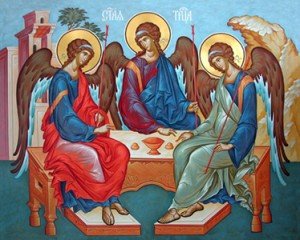 I have been presenting Arius’ ideas about Jesus and his relationship to God and, of course, Athanasius’ response to Arius. Arius seemed to picture the Father and Son as bottles or decanters that are filled by each other’s contents. In a similar fashion a prophet of God experienced this type of participation when filled with the Spirit. In this way Arius hoped to preserve the uniqueness of God while simultaneously elevating the “Son” to divine status, by participation rather than nature. For instance, when Jesus gently rebukes Philip for not recognizing “that I am in the Father and the Father is in me” (John 14:10), Arius understood this participation or to be similar to that which other human beings have at times experienced, though Jesus experienced it to a much great extent or degree.
I have been presenting Arius’ ideas about Jesus and his relationship to God and, of course, Athanasius’ response to Arius. Arius seemed to picture the Father and Son as bottles or decanters that are filled by each other’s contents. In a similar fashion a prophet of God experienced this type of participation when filled with the Spirit. In this way Arius hoped to preserve the uniqueness of God while simultaneously elevating the “Son” to divine status, by participation rather than nature. For instance, when Jesus gently rebukes Philip for not recognizing “that I am in the Father and the Father is in me” (John 14:10), Arius understood this participation or to be similar to that which other human beings have at times experienced, though Jesus experienced it to a much great extent or degree.
Athanasius would have none of this. Participation simply does not do justice to the biblical testimony concerning Christ, nor does it provide humanity with the savior it needs to be redeemed from sin. Athanasius wrote this:
I in the Father and the Father in me” does not mean (as the Arians suppose) that they are decanted into each other, being each filled from the other, as in the case of empty vessels, so that the Son fills the Father’s emptiness, and the Father the Son’s, each of them separately not being full and perfect. For the Father is full and perfect, and the Son is “the fullness of the godhead (Colossians 2:9). Again, God is not in the Son in the same way as he comes into the saints and thus strengthens them.
So the challenge that the Fathers of the Church faced and which someone like Arius attempted to deal with, was how Jesus could be fully God and, at the same time, fully man. This mystery is impossible for humans to comprehend. The natural tendency for humans is to believe either Jesus’ divine nature was predominant or his human nature was predominant. The true belief of the Church is, however, that Jesus is truly God and, simultaneously, truly man.
The great question that the Church had to solve was: What, then, does the Son partake in his relationship with the Father? Fathers of the Church like Athanasius and Cyril struggled to find the right words and ideas to answer this question.
